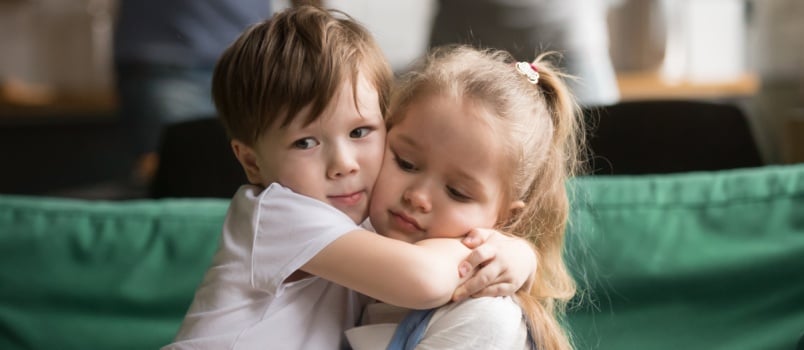7 Challenges Only Elder Siblings Understand in the Family

Heal & Grow Daily for a Happier Relationship
Subscribe FREEKey Takeaways
Marriage.com AI Quick Summary
Being the firstborn often feels like carrying an invisible backpack that’s filled with expectations, responsibilities, and unspoken rules. Parents may not even realize it, but their eyes are often on the oldest child first, waiting to see how they’ll lead the way.
Younger siblings may look up, admire, or even rebel, and somehow you’re expected to handle it all. It can feel like you’re both a guide and a guardian, all while trying to figure out your own life.
The role of an elder sibling can be rewarding, but it also comes with weight that others rarely see. At times, it feels like you’re walking a line between being a child yourself and being “the grown-up” everyone leans on.
What does it mean to be the elder sibling in a family?
Being the elder sibling often means stepping into a role that isn’t clearly written out, yet everyone seems to expect you to know it.
You’re the first to test the rules, the first to experience the joys and mistakes of growing up, and the one younger ones quietly (or not so quietly!) watch.
Sometimes it feels like you’re a built-in role model, other times like a safety net… and occasionally, both at once. Older siblings often discover that their place in the family is both a privilege and a pressure; it’s a chance to guide and protect, while still navigating their own path.
It’s not always easy, but it’s a role that carries both deep responsibility and unexpected rewards.
-
Why do elder siblings face unique challenges?
Elder siblings face unique challenges because they often carry unspoken expectations that shape how they grow. From being the first to set examples to balancing care with independence, the role can feel heavy at times.
Studies show that siblings shape the daily lives of each other as companions, rivals, and role models, influencing youth development both directly and indirectly. Their relationships are guided by individual traits, cultural values, and family dynamics, impacting well-being, roles within the family, and access to resources.
Elder sibling responsibilities usually go beyond chores—they include emotional support, guidance, and the quiet pressure to “get things right” before anyone else.
7 challenges only elder siblings understand in the family
Growing up as the oldest often means carrying more than just your own weight—it means navigating responsibilities, unspoken expectations, and family dynamics that younger siblings may never fully see.
Of course, the role comes with love and pride, but also challenges that shape who you are in quiet yet powerful ways. Here are 7 struggles only elder siblings can truly relate to.
1. Carrying unspoken family responsibilities
Elder siblings often find themselves taking on tasks that go beyond their years, whether it’s helping with homework, babysitting, or keeping an eye on the household.
Parents might not always ask directly, but the responsibility somehow lands in their lap. It can feel like an honor and a burden at the same time. While it builds resilience, it also means growing up a little faster than expected.
Here’s what it may look like:
- Helping a younger sibling with schoolwork after finishing your own.
- Cleaning or organizing while parents are busy or away.
- Taking charge of meals or bedtime when no one else can.
2. Acting as a role model
Whether they want to or not, elder siblings are often seen as examples. Younger brothers and sisters watch closely, copying behaviors, choices, and even mistakes.
One study shows that psychological adjustment among younger siblings relates to perceived acceptance from parents and elder siblings, not behavioral control. Most sibling pairs contributed uniquely. However, the perception that younger brothers have of acceptance from older sisters did not show a unique link to the adjustment of boys.
This silent spotlight can feel overwhelming at times, especially when all eyes are on the “firstborn.” It’s a constant reminder that their actions carry weight… sometimes in ways they never imagined.
Here’s what it may look like:
- A younger sibling mimicking your clothing or music taste.
- Parents reminding you that “they’re watching you, so behave.”
- Feeling pressure to hide mistakes so others don’t copy them.
3. Mediating sibling conflicts and dynamics
When siblings clash, the eldest often becomes the unofficial peacemaker. They might step in to calm arguments, balance emotions, or protect younger ones from trouble.
While this role teaches empathy and patience, it can also be draining. Holding that middle ground means sacrificing personal space, and at times, feeling like they’re carrying the family’s emotional load.
Here’s what it may look like:
- Breaking up fights over toys, chores, or screen time.
- Comforting one sibling while trying not to upset the other.
- Being blamed if arguments don’t get resolved fairly.
4. Pressure to succeed academically or professionally
Being the first child often comes with higher expectations from parents. Elder siblings are encouraged—or pushed—to achieve more, set standards, and “pave the way.”
The pressure can feel endless, making success feel less like personal growth and more like a family duty. While it may fuel ambition, it can also create anxiety and fear of failure.
Here’s what it may look like:
- Parents expecting perfect grades or top achievements.
- Being reminded that younger siblings will “follow your path.”
- Feeling like failure isn’t just personal—it affects the whole family.
5. Balancing independence with caregiving duties
Elder siblings sometimes find themselves pulled between wanting personal freedom and fulfilling family responsibilities. They may long to pursue hobbies, friendships, or adventures, yet feel guilty leaving younger siblings behind.
This balancing act can feel like walking a tightrope. One misstep can bring criticism or disappointment. It teaches sacrifice but also leaves little room for carefree choices.
Here’s what it may look like:
- Skipping outings with friends to babysit.
- Cancelling personal plans when parents need extra help.
- Feeling torn between self-care and family obligations.
6. Struggling with parental comparisons
Parents may compare their eldest child to younger siblings—sometimes without even realizing it. Hearing “You should set the example” or comparisons about grades, behavior, or success can sting deeply.
These remarks create invisible pressure that weighs heavily over time. For elder siblings, it can feel like their individuality is overshadowed by constant measurement.
Here’s what it may look like:
- Hearing “why can’t you be more like your sibling?”
- Feeling blamed if the younger ones misbehave.
- Believing your worth depends on performance, not personality.
Watch this TED Talk as 17-year-old Kyara Lalli shares her experience of growing up in her twin sister’s shadow, the impact of constant comparison, and how she learned to embrace confidence and self-acceptance:
7. Feeling like a third parent
Many elder siblings describe moments where they felt less like a brother or sister, and more like another parent. From comforting a crying sibling to managing household chaos, the line between sibling and caregiver blurs.
While it often builds maturity, it can also steal away the simplicity of childhood. That dual role is something only they can fully understand.
Here’s what it may look like:
- Rocking a baby sibling to sleep while still a child yourself.
- Guiding siblings through tough situations without adult support.
- Being the first person siblings run to before the parents.
How do sibling dynamics shape these challenges?
Sibling dynamics play a powerful role in shaping how these challenges unfold. The way brothers and sisters interact—through closeness, rivalry, or even quiet distance—can either soften the weight an elder sibling feels or make it even heavier.
Sometimes, these patterns shift over time, but the impact often lingers… shaping identity, relationships, and self-worth in lasting ways.
- Birth order influence: Being the firstborn often brings more responsibility, while younger siblings may feel freer to explore without as much pressure.
- Parental expectations: Parents may treat siblings differently, which creates comparisons that affect confidence and family roles.
- Cultural values: In some families, tradition emphasizes elder siblings as caretakers, shaping how duties are divided.
- Sibling rivalry: Competition for attention or resources can magnify stress, especially for the oldest child.
- Emotional bonds: Strong sibling closeness can turn challenges into shared growth, while distant ties may leave the elder sibling feeling isolated.
Sibling dynamics are never one-size-fits-all, and that is what makes them both challenging and beautiful. For some, the bond eases the burden of responsibility, while for others, it adds layers of stress and comparison.
Over time, these dynamics shape not just how siblings relate to each other, but also how they grow into themselves.
Turning struggles into strengths
Being the eldest in a family often feels like walking a path with both light and shadows. There is pride in knowing you have guided, protected, and inspired, yet there are moments when the weight of responsibility feels heavier than anyone realizes.
These challenges may not always be spoken about, but they shape character, resilience, and empathy in profound ways. And while it can sometimes feel lonely, it is also a role filled with love, trust, and meaning.
In the end, being an elder sibling is less about perfection and more about quietly shaping the family story, step by step.
Want a healthier, happier relationship - one step at a time?
 Tips
Tips
Write your tip or submit a video tip
All tips are reviewed before the publishing.
Share this article on
Related Quizzes
Heal & Grow Daily for a Happier, Healthier Relationship
Subscribe FREE on YouTube We'd love your feedback!
We'd love your feedback!
 Expert Q&A
Expert Q&A
Ask your question related to this topic & get the support you deserve from experts.


 Reviewed by
Reviewed by













 Thanks for your feedback!
Thanks for your feedback!